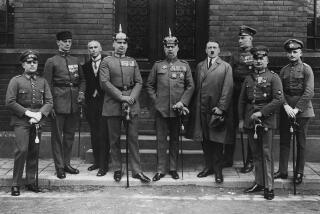When Right Made Might : THE DUEL: The Struggle Between Churchill and Hitler, 10 May--31 July 1940. <i> By John Lukacs (Ticknor & Fields/Houghton Mifflin: $19.95; 258 pp.)</i>
- Share via
In “The Duel,” John Lukacs’ 15th book, the Hungarian-born historian continues to distance himself subtly from the fashionable view of history as an inevitable force that attracted so many of his peers in the European intelligentsia. While these scholars and cafe-society intellectuals see individuals as little more than oil spots on the great engine of history, Lukacs has come to view them as the fundamental force behind historical change.
His emphasis on character, personality and the importance of an individual’s decision to do right or wrong should go over particularly well among Americans, who never have been as tolerant as the Europeans of grand and impersonal theories. Preferring explanations that point to personality and the inner self, we have tended to eschew those that emphasize environment, social class or even self-interest. (Sometimes, of course, to a fault: Labeling Saddam Hussein a madman, for instance, helps us explain away the entire Persian Gulf War.)
Displaying an easy familiarity with major ideas and events and the authority conferred by a glittering style and a definite historical vision, “The Duel” offers many examples of how the right man in the right place at the right time did the right thing, changing history for the better. We see how Winston Churchill’s sheer force of character overpowered English conservatives who thought he should negotiate peace with Hitler, for instance, and how a Norwegian military commander courageously risked ending his country’s neutrality by firing on a suspicious German cruiser, thereby enabling his king to escape and rally the resistance from abroad.
By no means conventional history, “The Duel” is literary and introspective, full of delicate parentheses and tangents, an extended rumination about the modern world by a conservative critic highly skeptical of the accepted wisdom about World War II. Don’t expect accounts of battles or campaigns, nor even a survey of strategic thinking. These Lukacs treats as givens, mere data whose broad outlines everyone knows and which he, an intellectual essayist above all, is not obligated to present.
Lukacs’ view of the conflict is equally unconventional, presenting it not as “the good war,” a la Studs Terkel, but as a calamity that helped destroy the traditional values and primacy of the old European upper bourgeoisie to which he and his family in Budapest belonged.
Lukacs understands what Marcel Ophuls demonstrated in “The Sorrow and the Pity”: that early in the war Hitler triumphed not only over Europe’s military, he managed to topple its dispirited democracies. He explains how very appealing the Nazi cult of youth and dynamism could appear in a time when democracy seemed soft, corrupt and played out, and when racism and especially anti-Semitism were widespread.
(Lukacs offers many telling asides about how fascism successfully equated itself with “the future”: Hitler never appeared on horseback, for example, but always in cars, the very symbol of drive and modernity. So it was with the remarkable Nazi propaganda films of the 1940 victories, which showed the mechanized cutting edge of the German army while carefully ignoring the horse-drawn wagons of its supply columns.)
Nazi “dynamism” attracted not only conservatives who feared communism, or even those workers who embraced the “socialism” in “National Socialism,” but also some prestigious intellectuals who later regretted their imprudence--and whose followers were shocked when the nasty news eventually surfaced. Lukacs, who doubtless saw some prominent Hungarians snuggling up, first to Nazism and then to communism, understands that intellectual creativity hardly guarantees doing the right thing.
What does? Lukacs’ answer: character. But what is “character”? What made Churchill act like Churchill, and Hitler like Hitler? The question is never explicitly asked, let alone answered. There are hints in this book, and especially in Lukacs’ 1990 autobiography, “Confessions of an Original Sinner,” that he equates character with class, with the WASP elite whose courage and integrity, exemplified by Churchill, has now become a subject of ridicule: Consider the images put forth in such recent films as “Metropolitan,” “Reversal of Fortune” and “Mr. and Mrs. Bridges.”
But while “character” seems an appealing ideal around which to rally, Lukacs uses it too nebulously, as a catchall of noble traits and behavior. Most dangerously, his insistence that Western Civilization itself was saved by such aristocrats as Churchill implies that the old ruling class, now dismissed as an anachronism, had much to be said for it, and that its demands for deference and privilege were, after all, absolutely justified.
More to Read
Sign up for our Book Club newsletter
Get the latest news, events and more from the Los Angeles Times Book Club, and help us get L.A. reading and talking.
You may occasionally receive promotional content from the Los Angeles Times.









